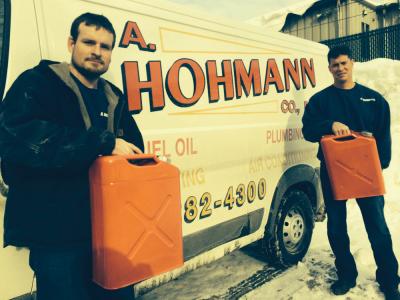February 18, 2015
 Phil McIntyre and Teddy Hohmann of A. Hohmann Co. hold up the five gallon GI cans that have become essential to getting emergency fuel deliveries to customers whose fill pipes are too deeply buried in snow. Bill Forry photo
Phil McIntyre and Teddy Hohmann of A. Hohmann Co. hold up the five gallon GI cans that have become essential to getting emergency fuel deliveries to customers whose fill pipes are too deeply buried in snow. Bill Forry photo
Eddie Hohmann has seen just about all you can see over his 53-year career in the fuel business. Hohmann Fuel Company has actually been in business for over 100 years; Eddie’s grandfather used a horse and wagon to deliver coal door-to-door.
Today, Hohmann Fuel has five delivery trucks and twice-that-number of service vans that fan out across the city to fix furnaces and pump oil into basement storage tanks.
It’s the latter job that has been a big hurdle in recent days.
“We’ve had to put two men on every truck, because it’s impossible for one person to pull the hose through this snow,” Hohmann explained to the Reporter this week.
“Plus the roads being so narrow, we’re trying to minimize how long we block the street.”
It helps, of course, when homeowner and landlords do their part by clearing the outdoor fill pipes that Hohmann’s crews need to reach to deliver their precious cargo. “We’re asking the customers if they call in or if we know there may be a problem to do some shoveling to give us access to the fill pipe,” says Hohmann. “If we have a problem and we can’t make a delivery, we will notify them and let them know what has to be done.”
There are certain homes that are tougher nuts to crack. In one instance, Hohmann says, his crew pulled their 150-foot hose through a front door and down through a window to reach a particularly difficult spot.
“Sometimes you just can’t get a truck through, so until they can widen the driveways what we end up doing is delivering fifty gallons at a time in five gallon cans and so none of our customers go without heat,” explains Hohmann. “We look at it this way: it’s a problem that has to be solved one way or another, because the customer cannot be left without heat. Whatever it takes for our automatic customers, we do it so their heat is not interrupted. And, we have not had anybody’s heat interrupted so far in this storm.”
So far, so good.
“When we had the blizzard in ’78, that was hard. Right now, everything we do is taking twice as long and costing twice as much,” says Hohmann, “but it’s part of the business and you just adjust. The trucks are going six days a week and if need be, they’ll go seven days. We try to get ahead of the storms so we don’t have to be rushing around.”
Bill and Ed Forry


